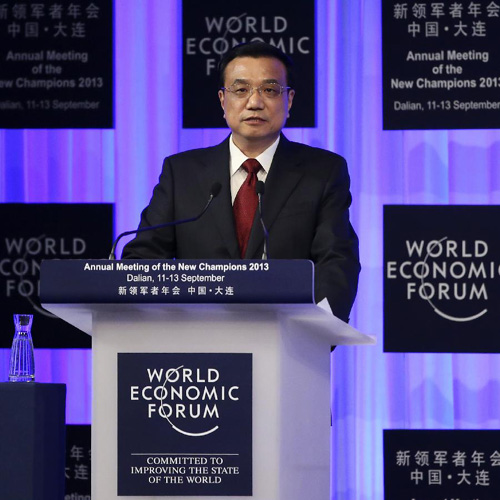
In the evening of Sept. 11, 2013, Premier Li Keqiang attended the opening ceremony of the seventh Summer Davos Forum and delivered special remarks in Dalian.
Present at the meeting were over 2,100 people including Executive Chairman Klaus Schwab of the World Economic Forum, Prime Minister Tigran Sargsyan of Armenia, Prime Minister Elio Di Rupo of Belgium, Prime Minister Plamen Oresharski of Bulgaria, Prime Minister Jyrki Katainen of Finland, Prime Minister Joseph Muscat of Malta, Deputy Prime Minister Arkady Dvorkovich of Russia, Deputy Prime Minister Ali Babacan of Turkey, as well as representatives from the political, business and academic communities of 90 countries and regions of the world.
Li Keqiang in the remarks said that five years have passed since the outbreak of the international financial crisis. Yet the world economy still faces a complex situation. Affected by a multiple of factors, economic growth in China has slowed down to some extent. It has drawn widespread attention. What I would like to say is that the Chinese economy is moving forward in a steady way and its fundamentals are sound.
Li Keqiang pointed out that confronted with downward pressures for this year, we stayed committed to the overall policy of seeking steady economic progress. We took a host of innovative policies and measures with a holistic approach to pursue steady growth, conduct structural readjustment and promote reform. First, keeping the macro economic policy stable with consideration given to both immediate and long-term needs. With respect to fiscal policy, we introduced policy measures that kept deficit from expanding, readjusted the expenditure structure, cut down administrative expenditures, accelerated spending, increased support for the central and western regions as well as for structural readjustments and for improving people's wellbeing. In terms of monetary policy, we stayed focused, responded calmly and met difficulties head-on. We did not relax or tighten the monetary policy in spite of the short-term fluctuation in the money market, and properly managed liquidity. Second, steadfastly pursuing reform and opening-up with priority given to the stimulation of the market. To vigorously reform the administrative system, to streamline administration and delegate power, to enhance the internal driving force for growth. We have expanded the scope of the business-to-value added tax pilot reform, and advanced reforms relating to market-based interest rates, government procurement of public services and other fields. We have accelerated the reform of economic structure, endeavored to develop a mixed economy, and provided greater space for business of various ownerships. We have explored new ways to open China wider to the outside world and adopted measures to facilitate foreign trade and promote a steady growth in import and export. Third, readjusting and optimizing the structure with emphasis on transformation and upgrading. We are cultivating new growth areas of consumption. We will enhance the weak links such as energy conservation, environmental protection and redevelopment of shantytowns. To adopt special policy measures to promote services, to implement the strategy of innovation-driven development, to build a social environment friendly to innovation and business start-up activities. In particular, we have innovated macro management and set a reasonable range of economic performance with a lower limit designed to ensure steady growth and job creation and an upper limit which is meant to avert inflation. We have also developed a macro policy framework in keeping with the reasonable range of economic performance. These measures have brought about a sound momentum of stable economic performance in China. In July and August, major indicators all rebounded, with enhanced market confidence and growing public expectations. We will meet the economic and social development goals set for the whole year.
Li Keqiang stressed that the Chinese economy has entered a phase of medium to high rate growth. Though lower than the near double-digit rates seen in previous years, a growth in the neighborhood of 7.5% is still considered high for any major economy in the world. The process of industrialization and urbanization is far from being completed in China, which promises a big room for regional development and huge market potential. Reform is bound to unleash fresh institutional vitality. We are well placed to sustain a healthy economic growth in the long run, so as to unceasingly increase the employment and income of urban and rural residents, to continue to improve people's livelihood and to let the fruits of reform and development benefit as many people as possible.
Li Keqiang pointed out that as a major developing country, China is ready to take up its responsibility in international affairs. We are willing to make our contribution to a strong, sustainable and balanced world economy. However, the international responsibilities and obligations China undertakes must be commensurate with both the level and approach of its development. Members of the international community should now increase coordination on macro economic policies, so as to minimize the adverse impact of the change of macro economic policies by some countries on the entire world economy, especially on emerging market economies.
Li Keqiang finally said that innovation is the banner that we will always hold high. The new season of the Chinese economic miracle, one of better quality and higher efficiency, is unveiled, and I guarantee you even more exciting stories to come. As long as we remain committed to long-term goals, focus on addressing immediate challenges and stay firm on the path of reform and opening-up, we will surely advance unceasingly the cause of building socialism with Chinese characteristics.
After delivering the remarks, Li Keqiang as well answered on the site the questions concerning the reform of China's financial system, international trade system and other topics.
Yang Jing, State Councilor and Secretary General of the State Council, was present.